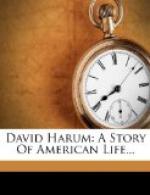In the case of the present volume the conditions are identical with those just mentioned. Most of the scenes are laid in central New York, where the author, Edward Noyes Westcott, was born, September 24, 1847, and where he died of consumption, March 31, 1898. Nearly all his life was passed in his native city of Syracuse, and although banking and not authorship was the occupation of his active years, yet his sensitive and impressionable temperament had become so saturated with the local atmosphere, and his retentive memory so charged with facts, that when at length he took up the pen he was able to create in David Harum a character so original, so true, and so strong, yet withal so delightfully quaint and humorous, that we are at once compelled to admit that here is a new and permanent addition to the long list of American literary portraits.
The book is a novel, and throughout it runs a love story which is characterized by sympathetic treatment and a constantly increasing interest; but the title role is taken by the old country banker, David Harum: dry, quaint, somewhat illiterate, no doubt, but possessing an amazing amount of knowledge not found in printed books, and holding fast to the cheerful belief that there is nothing wholly bad or useless in this world. Or, in his own words: “A reasonable amount of fleas is good for a dog—they keep him f’m broodin’ on bein’ a dog.” This horse-trading country banker and reputed Shylock, but real philanthropist, is an accurate portrayal of a type that exists in the rural districts of central New York to-day. Variations of him may be seen daily, driving about in their road wagons or seated in their “bank parlors,” shrewd, sharp-tongued, honest as the sunlight from most points of view, but in a horse trade much inclined to follow the rule laid down by Mr. Harum himself for such transactions: “Do unto the other feller the way he’d like to do unto you—an’ do it fust.”
The genial humor and sunny atmosphere which pervade these pages are in dramatic contrast with the circumstances under which they were written. The book was finished while the author lay upon his deathbed, but, happily for the reader, no trace of his sufferings appears here. It was not granted that he should live to see his work in its present completed form, a consummation he most earnestly desired; but it seems not unreasonable to hope that the result of his labors will be appreciated, and that David Harum will endure.
Forbes HEERMANS.
Syracuse, N.Y., August 20, 1898.
DAVID HARUM.
CHAPTER I.
David poured half of his second cup of tea into his saucer to lower its temperature to the drinking point, and helped himself to a second cut of ham and a third egg. Whatever was on his mind to have kept him unusually silent during the evening meal, and to cause certain wrinkles in his forehead suggestive of perplexity or misgiving, had not impaired his appetite. David was what he called “a good feeder.”




